21天养成良好英语习惯
最新学习习惯养成计划——21天法则的运用 英语教学论文名师资料合集

学习习惯养成计划——21天法则的运用【摘要】“思想决定行为,行为决定习惯,习惯决定命运。
”一个良好的习惯可以导向成功。
一个优秀的学生必然拥有良好的学习习惯。
英语作为语言类课程,需要学生反复不断的记忆和练习,尤其要注重学生学习习惯的培养。
对于习惯的养成,行为心理学认为,一种行为重复21天就会变成习惯性动作。
90天的重复会形成稳定的习惯,即21天是一个行为或想法在不断的重复中形成的必要天数。
本文拟从在英语教学入手,通过21天法则探讨培养学生良好学习习惯的策略。
【关键词】21天习惯养成法学习习惯是在学习过程中经过反复练习形成并发展,成为一种个体需要的自动化学习行为方式。
良好的学习习惯,有利于激发学生学习的积极性和主动性;有利于形成学习策略,提高学习效率;有利于培养自主学习能力;有利于培养学生的创新精神和创造能力,使学生终身受益。
初中生学习成绩不佳与多种因素有关,其中起主导作用的是他们的学习习惯不好。
事实上,大约有70%到80%的学生在学习习惯方面存在问题,具有一定的普遍性和代表性。
初中阶段是各种习惯诸如生活习惯、卫生习惯,尤其是学习习惯养成的最佳时期。
良好的习惯一旦形成,就会变成人生道路上前进的巨大力量。
所以初中要特别注意对学生习惯的培养。
培养的方法中,21天习惯养成法值得推荐。
21天习惯养成法是这几年来心理学界和管理学界研究得出并在各个领域中得到实践的一个定律。
指的是在行为心理学中,人们把一个人的新习惯或理念的形成并得以巩固至少需要21天的现象,称之为21天效应。
即一个人的动作、或想法,如果重复21天就会变成一个习惯性的动作或想法。
也就是说,一个好习惯的养成,一种好的生活习惯的形成,好的学习方法的强化,只需要21天。
由于它在工作、戒瘾等方面实效显著,也渐渐地受到了一些教育学家的关注,在教学实践中合理地运用起来。
在21天习惯养成法里,习惯的形成大致分三个阶段:第一阶段:1~7天左右。
此阶段的特征是“刻意,不自然”。
21天英语学习成长计划
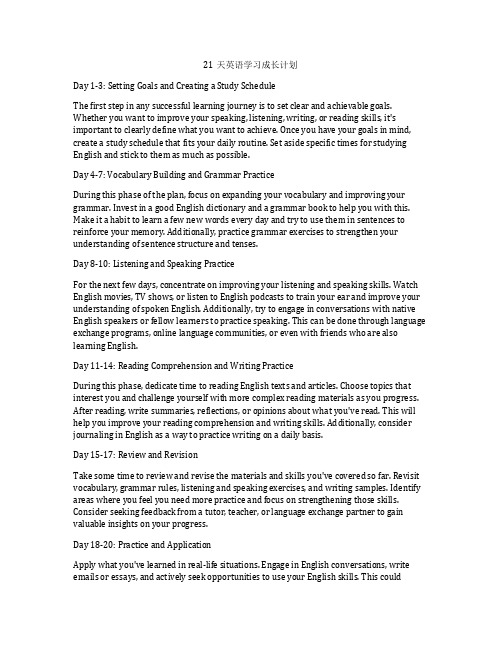
21天英语学习成长计划Day 1-3: Setting Goals and Creating a Study ScheduleThe first step in any successful learning journey is to set clear and achievable goals. Whether you want to improve your speaking, listening, writing, or reading skills, it's important to clearly define what you want to achieve. Once you have your goals in mind, create a study schedule that fits your daily routine. Set aside specific times for studying English and stick to them as much as possible.Day 4-7: Vocabulary Building and Grammar PracticeDuring this phase of the plan, focus on expanding your vocabulary and improving your grammar. Invest in a good English dictionary and a grammar book to help you with this. Make it a habit to learn a few new words every day and try to use them in sentences to reinforce your memory. Additionally, practice grammar exercises to strengthen your understanding of sentence structure and tenses.Day 8-10: Listening and Speaking PracticeFor the next few days, concentrate on improving your listening and speaking skills. Watch English movies, TV shows, or listen to English podcasts to train your ear and improve your understanding of spoken English. Additionally, try to engage in conversations with native English speakers or fellow learners to practice speaking. This can be done through language exchange programs, online language communities, or even with friends who are also learning English.Day 11-14: Reading Comprehension and Writing PracticeDuring this phase, dedicate time to reading English texts and articles. Choose topics that interest you and challenge yourself with more complex reading materials as you progress. After reading, write summaries, reflections, or opinions about what you've read. This will help you improve your reading comprehension and writing skills. Additionally, consider journaling in English as a way to practice writing on a daily basis.Day 15-17: Review and RevisionTake some time to review and revise the materials and skills you've covered so far. Revisit vocabulary, grammar rules, listening and speaking exercises, and writing samples. Identify areas where you feel you need more practice and focus on strengthening those skills. Consider seeking feedback from a tutor, teacher, or language exchange partner to gain valuable insights on your progress.Day 18-20: Practice and ApplicationApply what you've learned in real-life situations. Engage in English conversations, write emails or essays, and actively seek opportunities to use your English skills. This couldinvolve participating in discussions, giving presentations, or even just ordering food in English at a restaurant. The more you practice, the more confident and fluent you'll become. Day 21: Reflection and Future PlansOn the final day of the plan, take some time to reflect on your progress and accomplishments. Celebrate your achievements and identify areas where you still need improvement. Based on your reflections, create a plan for continued learning beyond the 21 days. Set new goals and adjust your study schedule as needed to ensure that you continue to grow and develop your English skills.In conclusion, this 21-day English learning and growth plan is designed to provide a structured approach to improving your language skills. By setting goals, creating a study schedule, focusing on vocabulary, grammar, listening, speaking, reading, and writing, and actively practicing and applying your skills, you'll make significant progress in your English language journey. Remember that consistent effort and dedication are key to success, and that continuous learning is a lifelong journey. Good luck!。
通过21天阅读计划培养小学生的英语持续默读习惯
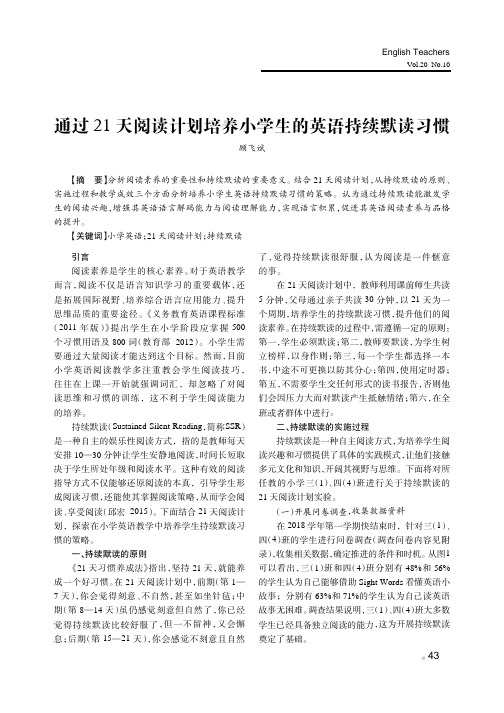
Vol.20No.10引言阅读素养是学生的核心素养。
对于英语教学而言,阅读不仅是语言知识学习的重要载体,还是拓展国际视野、培养综合语言应用能力、提升思维品质的重要途径。
《义务教育英语课程标准(2011年版)》提出学生在小学阶段应掌握500个习惯用语及800词(教育部2012)。
小学生需要通过大量阅读才能达到这个目标。
然而,目前小学英语阅读教学多注重教会学生阅读技巧,往往在上课一开始就强调词汇,却忽略了对阅读思维和习惯的训练,这不利于学生阅读能力的培养。
持续默读(Sustained Silent Reading,简称SSR)是一种自主的娱乐性阅读方式,指的是教师每天安排10—30分钟让学生安静地阅读,时间长短取决于学生所处年级和阅读水平。
这种有效的阅读指导方式不仅能够还原阅读的本真,引导学生形成阅读习惯,还能使其掌握阅读策略,从而学会阅读、享受阅读(邱宏2015)。
下面结合21天阅读计划,探索在小学英语教学中培养学生持续默读习惯的策略。
一、持续默读的原则《21天习惯养成法》指出,坚持21天,就能养成一个好习惯。
在21天阅读计划中,前期(第1—7天),你会觉得刻意、不自然,甚至如坐针毡;中期(第8—14天)虽仍感觉刻意但自然了,你已经觉得持续默读比较舒服了,但一不留神,又会懈怠;后期(第15—21天),你会感觉不刻意且自然了,觉得持续默读很舒服,认为阅读是一件惬意的事。
在21天阅读计划中,教师利用课前师生共读5分钟,父母通过亲子共读30分钟,以21天为一个周期,培养学生的持续默读习惯,提升他们的阅读素养。
在持续默读的过程中,需遵循一定的原则:第一,学生必须默读;第二,教师要默读,为学生树立榜样,以身作则;第三,每一个学生都选择一本书,中途不可更换以防其分心;第四,使用定时器;第五,不需要学生交任何形式的读书报告,否则他们会因压力大而对默读产生抵触情绪;第六,在全班或者群体中进行。
二、持续默读的实施过程持续默读是一种自主阅读方式,为培养学生阅读兴趣和习惯提供了具体的实践模式,让他们接触多元文化和知识,开阔其视野与思维。
小学英语经典晨读21天提升计划
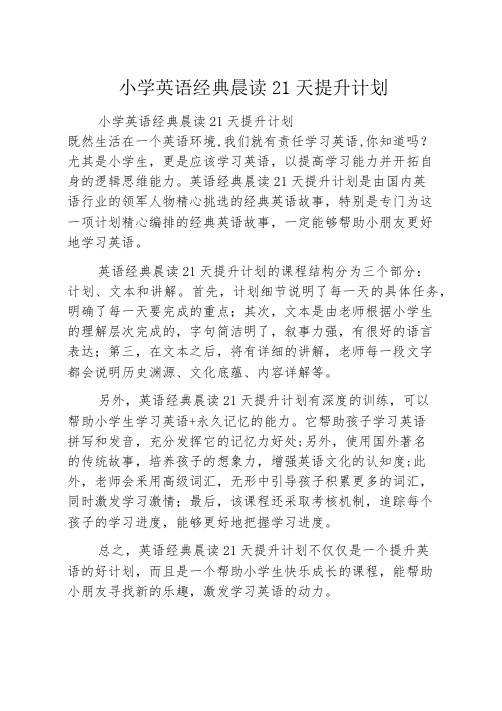
小学英语经典晨读21天提升计划
小学英语经典晨读21天提升计划
既然生活在一个英语环境,我们就有责任学习英语,你知道吗?
尤其是小学生,更是应该学习英语,以提高学习能力并开拓自
身的逻辑思维能力。
英语经典晨读21天提升计划是由国内英
语行业的领军人物精心挑选的经典英语故事,特别是专门为这
一项计划精心编排的经典英语故事,一定能够帮助小朋友更好
地学习英语。
英语经典晨读21天提升计划的课程结构分为三个部分:
计划、文本和讲解。
首先,计划细节说明了每一天的具体任务,明确了每一天要完成的重点;其次,文本是由老师根据小学生
的理解层次完成的,字句简洁明了,叙事力强,有很好的语言
表达;第三,在文本之后,将有详细的讲解,老师每一段文字
都会说明历史渊源、文化底蕴、内容详解等。
另外,英语经典晨读21天提升计划有深度的训练,可以
帮助小学生学习英语+永久记忆的能力。
它帮助孩子学习英语
拼写和发音,充分发挥它的记忆力好处;另外,使用国外著名
的传统故事,培养孩子的想象力,增强英语文化的认知度;此外,老师会釆用高级词汇,无形中引导孩子积累更多的词汇,
同时激发学习激情;最后,该课程还采取考核机制,追踪每个
孩子的学习进度,能够更好地把握学习进度。
总之,英语经典晨读21天提升计划不仅仅是一个提升英
语的好计划,而且是一个帮助小学生快乐成长的课程,能帮助
小朋友寻找新的乐趣,激发学习英语的动力。
英语21天打卡方案
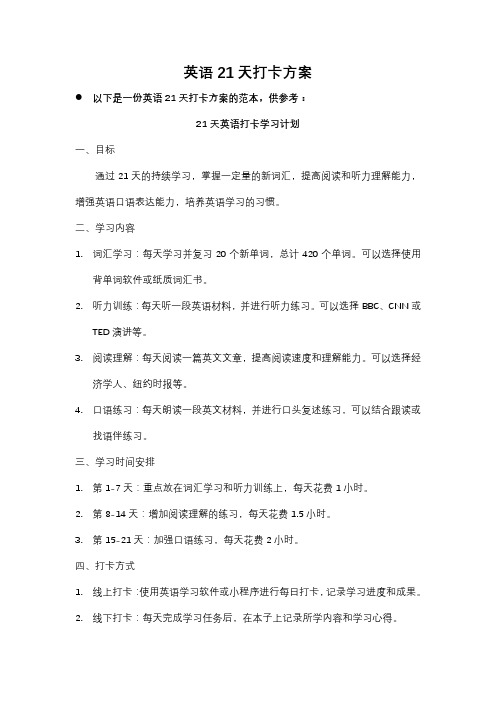
英语21天打卡方案
以下是一份英语21天打卡方案的范本,供参考:
21天英语打卡学习计划
一、目标
通过21天的持续学习,掌握一定量的新词汇,提高阅读和听力理解能力,增强英语口语表达能力,培养英语学习的习惯。
二、学习内容
1.词汇学习:每天学习并复习20个新单词,总计420个单词。
可以选择使用
背单词软件或纸质词汇书。
2.听力训练:每天听一段英语材料,并进行听力练习。
可以选择BBC、CNN或
TED演讲等。
3.阅读理解:每天阅读一篇英文文章,提高阅读速度和理解能力。
可以选择经
济学人、纽约时报等。
4.口语练习:每天朗读一段英文材料,并进行口头复述练习,可以结合跟读或
找语伴练习。
三、学习时间安排
1.第1-7天:重点放在词汇学习和听力训练上,每天花费1小时。
2.第8-14天:增加阅读理解的练习,每天花费1.5小时。
3.第15-21天:加强口语练习,每天花费2小时。
四、打卡方式
1.线上打卡:使用英语学习软件或小程序进行每日打卡,记录学习进度和成果。
2.线下打卡:每天完成学习任务后,在本子上记录所学内容和学习心得。
五、奖励机制
完成21天打卡计划后,可以给自己一个小奖励,如看一部英文电影、买一本英文书籍或去英语角与他人交流。
六、注意事项
1.保持学习的持续性,即使某天时间紧张,也尽量完成部分学习任务。
2.遇到困难时,不要轻易放弃,可以寻求他人帮助或查阅资料解决问题。
3.学习过程中要注重实际应用,结合日常生活场景进行实践。
好习惯21天养成英语作文
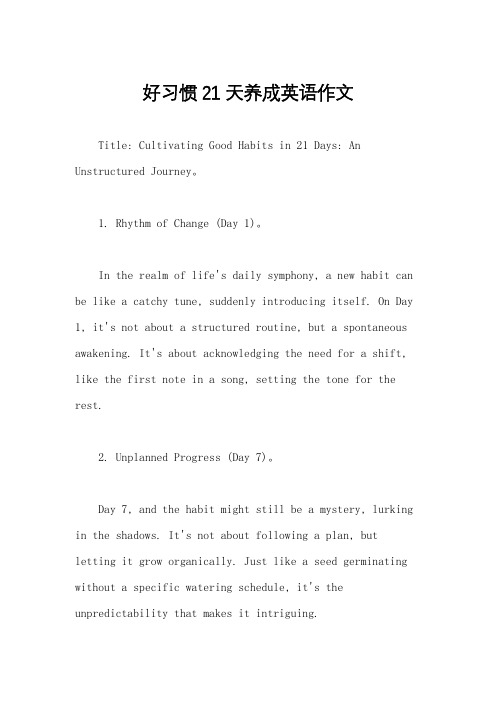
好习惯21天养成英语作文Title: Cultivating Good Habits in 21 Days: An Unstructured Journey。
1. Rhythm of Change (Day 1)。
In the realm of life's daily symphony, a new habit can be like a catchy tune, suddenly introducing itself. On Day 1, it's not about a structured routine, but a spontaneous awakening. It's about acknowledging the need for a shift, like the first note in a song, setting the tone for the rest.2. Unplanned Progress (Day 7)。
Day 7, and the habit might still be a mystery, lurking in the shadows. It's not about following a plan, but letting it grow organically. Just like a seed germinating without a specific watering schedule, it's the unpredictability that makes it intriguing.3. The Art of Adaptability (Day 14)。
On Day 14, the habit becomes a part of your daily dance, adapting to your life's tempo. It's not about rigidity, but fluidity. Just like a jazz improviser, you're learning to mold it to your unique circumstances.4. The Unexpected Benefits (Day 21)。
小学英语经典晨读21天
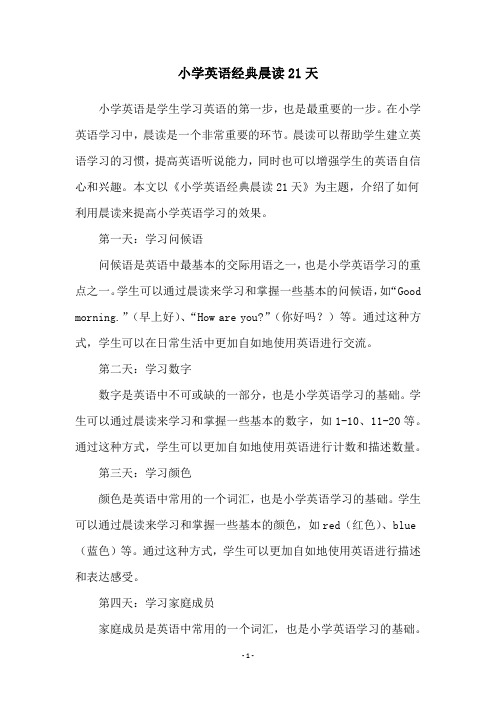
小学英语经典晨读21天小学英语是学生学习英语的第一步,也是最重要的一步。
在小学英语学习中,晨读是一个非常重要的环节。
晨读可以帮助学生建立英语学习的习惯,提高英语听说能力,同时也可以增强学生的英语自信心和兴趣。
本文以《小学英语经典晨读21天》为主题,介绍了如何利用晨读来提高小学英语学习的效果。
第一天:学习问候语问候语是英语中最基本的交际用语之一,也是小学英语学习的重点之一。
学生可以通过晨读来学习和掌握一些基本的问候语,如“Good morning.”(早上好)、“How are you?”(你好吗?)等。
通过这种方式,学生可以在日常生活中更加自如地使用英语进行交流。
第二天:学习数字数字是英语中不可或缺的一部分,也是小学英语学习的基础。
学生可以通过晨读来学习和掌握一些基本的数字,如1-10、11-20等。
通过这种方式,学生可以更加自如地使用英语进行计数和描述数量。
第三天:学习颜色颜色是英语中常用的一个词汇,也是小学英语学习的基础。
学生可以通过晨读来学习和掌握一些基本的颜色,如red(红色)、blue (蓝色)等。
通过这种方式,学生可以更加自如地使用英语进行描述和表达感受。
第四天:学习家庭成员家庭成员是英语中常用的一个词汇,也是小学英语学习的基础。
学生可以通过晨读来学习和掌握一些基本的家庭成员,如father(父亲)、mother(母亲)等。
通过这种方式,学生可以更加自如地使用英语进行描述和介绍自己的家庭。
第五天:学习动物动物是英语中常用的一个词汇,也是小学英语学习的基础。
学生可以通过晨读来学习和掌握一些基本的动物,如dog(狗)、cat(猫)等。
通过这种方式,学生可以更加自如地使用英语进行描述和表达感受。
第六天:学习食物食物是英语中常用的一个词汇,也是小学英语学习的基础。
学生可以通过晨读来学习和掌握一些基本的食物,如apple(苹果)、bread (面包)等。
通过这种方式,学生可以更加自如地使用英语进行描述和表达感受。
在小学英语教学中渗透积极心理健康教育
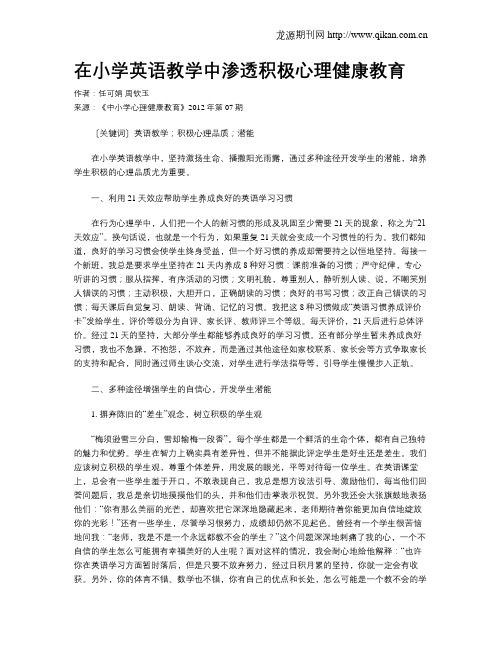
在小学英语教学中渗透积极心理健康教育作者:任可娟周钦玉来源:《中小学心理健康教育》2012年第07期〔关键词〕英语教学;积极心理品质;潜能在小学英语教学中,坚持激扬生命、播撒阳光雨露,通过多种途径开发学生的潜能,培养学生积极的心理品质尤为重要。
一、利用21天效应帮助学生养成良好的英语学习习惯在行为心理学中,人们把一个人的新习惯的形成及巩固至少需要21天的现象,称之为“21天效应”。
换句话说,也就是一个行为,如果重复21天就会变成一个习惯性的行为。
我们都知道,良好的学习习惯会使学生终身受益,但一个好习惯的养成却需要持之以恒地坚持。
每接一个新班,我总是要求学生坚持在21天内养成8种好习惯:课前准备的习惯;严守纪律,专心听讲的习惯;服从指挥,有序活动的习惯;文明礼貌,尊重别人,静听别人读、说,不嘲笑别人错误的习惯;主动积极,大胆开口,正确朗读的习惯;良好的书写习惯;改正自己错误的习惯;每天课后自觉复习、朗读、背诵、记忆的习惯。
我把这8种习惯做成“英语习惯养成评价卡”发给学生,评价等级分为自评、家长评、教师评三个等级。
每天评价,21天后进行总体评价。
经过21天的坚持,大部分学生都能够养成良好的学习习惯。
还有部分学生暂未养成良好习惯,我也不急躁,不抱怨,不放弃,而是通过其他途径如家校联系、家长会等方式争取家长的支持和配合,同时通过师生谈心交流,对学生进行学法指导等,引导学生慢慢步入正轨。
二、多种途径增强学生的自信心,开发学生潜能1. 摒弃陈旧的“差生”观念,树立积极的学生观“梅须逊雪三分白,雪却输梅一段香”,每个学生都是一个鲜活的生命个体,都有自己独特的魅力和优势。
学生在智力上确实具有差异性,但并不能据此评定学生是好生还是差生。
我们应该树立积极的学生观,尊重个体差异,用发展的眼光,平等对待每一位学生。
在英语课堂上,总会有一些学生羞于开口,不敢表现自己,我总是想方设法引导、激励他们,每当他们回答问题后,我总是亲切地摸摸他们的头,并和他们击掌表示祝贺。
21天习惯养成计划感悟
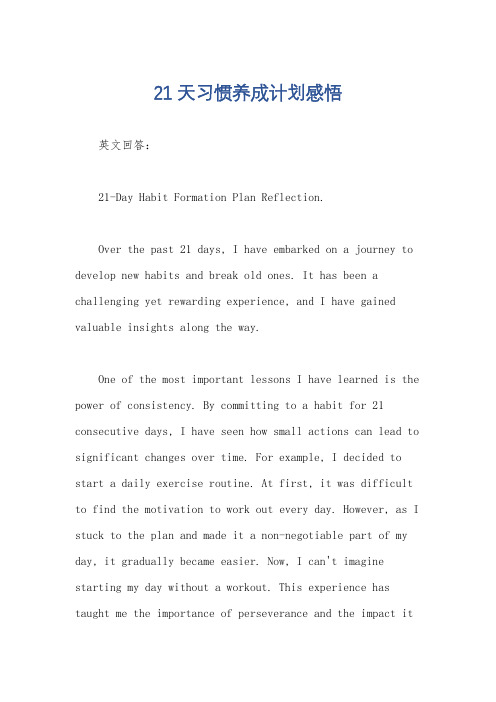
21天习惯养成计划感悟英文回答:21-Day Habit Formation Plan Reflection.Over the past 21 days, I have embarked on a journey to develop new habits and break old ones. It has been a challenging yet rewarding experience, and I have gained valuable insights along the way.One of the most important lessons I have learned is the power of consistency. By committing to a habit for 21 consecutive days, I have seen how small actions can lead to significant changes over time. For example, I decided to start a daily exercise routine. At first, it was difficult to find the motivation to work out every day. However, as I stuck to the plan and made it a non-negotiable part of my day, it gradually became easier. Now, I can't imagine starting my day without a workout. This experience has taught me the importance of perseverance and the impact itcan have on achieving our goals.Another key takeaway from this habit formation plan is the role of accountability. I found that sharing my progress with a friend or family member helped me stay on track. Knowing that someone else was aware of my goals and would check in on my progress motivated me to stay committed. For instance, I wanted to develop a habit of reading for at least 30 minutes every day. By sharing this goal with my best friend, we would discuss the books we were reading and hold each other accountable. It not only made the habit more enjoyable but also kept me motivated to continue.Additionally, I realized the importance of starting small and gradually increasing the difficulty. When trying to develop a new habit, it can be overwhelming to jump in at the deep end. By starting with small, manageable actions and gradually increasing the intensity or duration, I found it easier to stick to the habit. For example, I wanted to incorporate meditation into my daily routine. Instead of aiming for an hour-long meditation session from the start,I began with just five minutes and gradually increased it to 20 minutes over the course of the 21 days. This approach made the habit more sustainable and allowed me to build momentum.Lastly, I discovered the power of positive reinforcement. Celebrating small wins along the way and rewarding myself for sticking to the habit helped me stay motivated. For instance, every time I completed a week of consistently practicing a new habit, I would treat myself to a small indulgence, like a piece of chocolate or a relaxing bubble bath. This positive reinforcement not only made the process more enjoyable but also reinforced the behavior I was trying to cultivate.中文回答:21天习惯养成计划感悟。
21天好习惯自我评价
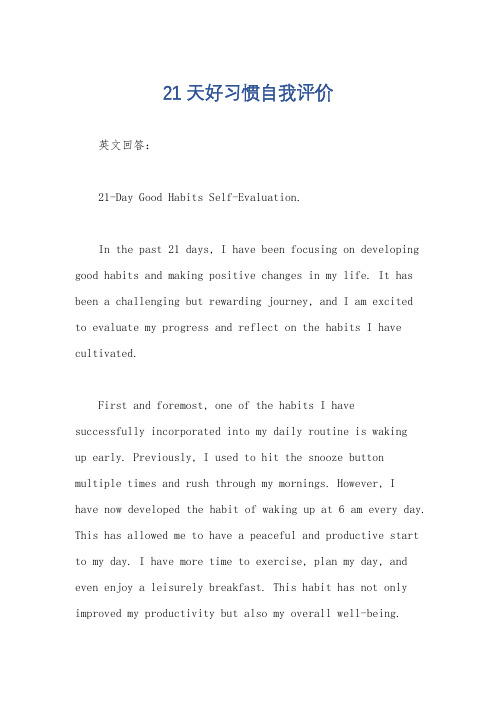
21天好习惯自我评价英文回答:21-Day Good Habits Self-Evaluation.In the past 21 days, I have been focusing on developing good habits and making positive changes in my life. It has been a challenging but rewarding journey, and I am excitedto evaluate my progress and reflect on the habits I have cultivated.First and foremost, one of the habits I havesuccessfully incorporated into my daily routine is wakingup early. Previously, I used to hit the snooze button multiple times and rush through my mornings. However, Ihave now developed the habit of waking up at 6 am every day. This has allowed me to have a peaceful and productive start to my day. I have more time to exercise, plan my day, and even enjoy a leisurely breakfast. This habit has not only improved my productivity but also my overall well-being.Another habit that I have been working on is practicing gratitude. Each day, I take a few minutes to reflect on the things I am grateful for. This simple practice has helped me shift my focus from negative to positive aspects of my life. It has made me more appreciative of the little things and has improved my overall outlook on life. For example, instead of complaining about a long commute, I now appreciate the opportunity to listen to audiobooks or podcasts during that time.Furthermore, I have made it a habit to exercise for at least 30 minutes every day. Whether it's going for a run, attending a fitness class, or doing home workouts, I prioritize physical activity in my daily routine. Regular exercise not only keeps me fit but also boosts my energy levels and improves my mood. It has become a non-negotiable part of my day, and I feel great knowing that I am taking care of my physical health.In addition to these habits, I have also been working on improving my time management skills. I have startedusing a planner to prioritize my tasks and allocate timefor each of them. This has helped me stay organized and ensure that I am making progress towards my goals. For instance, I used to procrastinate on important tasks, but now I break them down into smaller, manageable steps and tackle them one at a time. This has significantly reducedmy stress levels and increased my productivity.中文回答:21天好习惯自我评价。
21天养成习惯计划家长评价
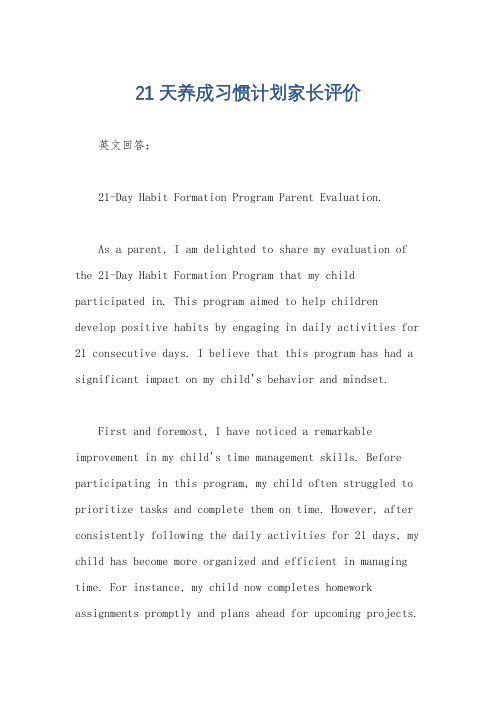
21天养成习惯计划家长评价英文回答:21-Day Habit Formation Program Parent Evaluation.As a parent, I am delighted to share my evaluation of the 21-Day Habit Formation Program that my child participated in. This program aimed to help children develop positive habits by engaging in daily activities for 21 consecutive days. I believe that this program has had a significant impact on my child's behavior and mindset.First and foremost, I have noticed a remarkable improvement in my child's time management skills. Before participating in this program, my child often struggled to prioritize tasks and complete them on time. However, after consistently following the daily activities for 21 days, my child has become more organized and efficient in managing time. For instance, my child now completes homework assignments promptly and plans ahead for upcoming projects.Furthermore, the 21-Day Habit Formation Program has instilled a sense of discipline in my child. Through the daily activities, my child learned the importance of consistency and dedication. This has translated into other areas of my child's life, such as practicing a musical instrument or engaging in regular physical exercise. The program has taught my child that success is achieved through perseverance and commitment.In addition, the program has helped my child develop a growth mindset. By encouraging my child to set realistic goals and track progress, the program has fostered a sense of resilience and determination. My child now approaches challenges with a positive attitude, believing that effort and practice lead to improvement. For example, my child used to shy away from public speaking, but after participating in the program, my child willingly volunteered to give a presentation in class.Moreover, the 21-Day Habit Formation Program has enhanced my child's self-discipline. By engaging in dailyactivities, my child has learned to resist temptations and stay focused on long-term goals. This has been particularly evident in my child's dietary choices. Previously, my child would frequently indulge in unhealthy snacks. However,after completing the program, my child has developed ahabit of choosing nutritious options and limiting junk food consumption.Overall, I am extremely pleased with the results of the 21-Day Habit Formation Program. It has positivelyinfluenced my child's time management, discipline, mindset, and self-discipline. The program has equipped my child with valuable skills that will undoubtedly contribute to future success. I highly recommend this program to other parents who wish to cultivate positive habits in their children.中文回答:21天养成习惯计划家长评价。
英语21天学习计划
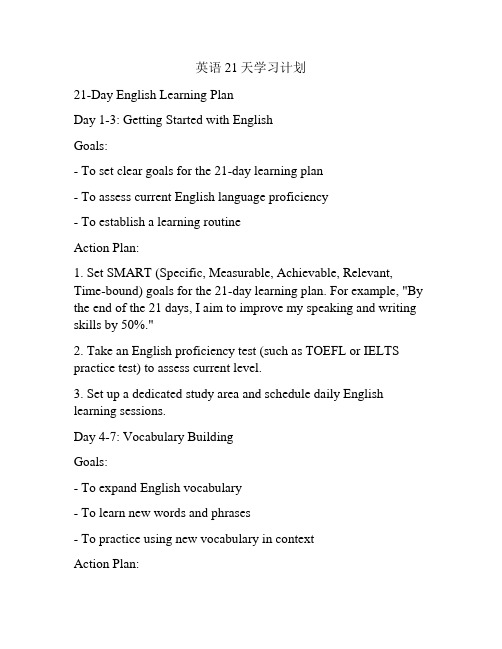
英语21天学习计划21-Day English Learning PlanDay 1-3: Getting Started with EnglishGoals:- To set clear goals for the 21-day learning plan- To assess current English language proficiency- To establish a learning routineAction Plan:1. Set SMART (Specific, Measurable, Achievable, Relevant, Time-bound) goals for the 21-day learning plan. For example, "By the end of the 21 days, I aim to improve my speaking and writing skills by 50%."2. Take an English proficiency test (such as TOEFL or IELTS practice test) to assess current level.3. Set up a dedicated study area and schedule daily English learning sessions.Day 4-7: Vocabulary BuildingGoals:- To expand English vocabulary- To learn new words and phrases- To practice using new vocabulary in contextAction Plan:1. Choose a list of 50-100 new English words and phrases to learn during these 4 days.2. Use flashcards or a vocabulary app to learn and review the new words daily.3. Practice using the new vocabulary in sentences and conversations.Day 8-11: Grammar and Sentence StructureGoals:- To review and improve English grammar- To understand sentence structure and formation- To practice constructing grammatically correct sentencesAction Plan:1. Review basic English grammar rules and identify areas for improvement (e.g. tenses, articles, prepositions).2. Take online grammar quizzes or use grammar books to reinforce understanding.3. Write short paragraphs or essays to practice using correct sentence structure and grammar.Day 12-14: Listening ComprehensionGoals:- To improve listening skills in English- To understand different English accents and intonations- To practice listening to English in various contextsAction Plan:1. Listen to English podcasts, news, or music for at least 30 minutes each day.2. Take notes on key points or vocabulary while listening.3. Watch English movies or TV shows with subtitles to improve comprehension.Day 15-17: Speaking PracticeGoals:- To improve spoken English fluency- To gain confidence in speaking English- To practice pronunciation and intonationAction Plan:1. Find a language exchange partner or a tutor for conversational practice.2. Record yourself speaking and listen for pronunciation and intonation.3. Engage in daily speaking exercises, such as describing a picture, telling a story, or discussing a topic.Day 18-21: Writing Skills DevelopmentGoals:- To enhance writing skills in English- To practice writing essays, emails, or reports- To receive feedback and make improvementsAction Plan:1. Write a short essay or journal entry on a chosen topic daily.2. Review and edit your writing for grammar, vocabulary, and coherence.3. Seek feedback from a teacher, tutor, or language exchange partner to improve writing skills.Final Day: Reflection and AssessmentGoals:- To evaluate progress and achievements in English learning- To identify areas for further improvement and continued practice - To celebrate accomplishments and set new goals for future learningAction Plan:1. Reflect on the 21-day learning journey and assess improvements in English language skills.2. Identify areas that still need improvement and set new goals for ongoing learning.3. Reward yourself for completing the 21-day English learning plan and celebrate your accomplishments.By following this 21-day English learning plan, you can make significant progress in improving your language skills. Remember to stay disciplined, practice consistently, and seek opportunities touse English in real-life situations. Good luck with your English learning journey!。
小学英语经典晨读21天提升计划

在这一章中,作者首先强调了晨读对于英语学习的重要性,并介绍了这本书 的目的和结构。通过晨读,学生可以培养语感、记忆单词、提高阅读速度和理解 能力。
这一章是本书的核心部分,作者详细介绍了21天提升计划的实施方法和具体 内容。每天的晨读材料都包括一篇短文、一句名言和一个单词表。学生可以通过 朗读短文提高阅读理解能力,通过名言学习地道的语言表达方式,通过单词表扩 充词汇量。
小学英语经典晨读21天提升计划
读书笔记
01 思维导图
03 精彩摘录 05 目录分析
目录
02 内容摘要 04 阅读感受 06 作者简介
思维导图
关键字分析思维导图
英语
口语
提升
学习
提高
部分
小学
计划
小学
小学生 通过
阅读
经典
内容
有趣
知识
适合
能力
帮助
内容摘要
《小学英语经典晨读21天提升计划》是一本旨在通过21天的晨读计划,帮助小学生提高英语阅读 和口语能力的书籍。本书以简单易懂的语言和生动有趣的例子,让小学生在轻松愉快的氛围中学 习英语。
我要感谢这本书的作者和商,感谢他们为孩子们提供这样一本有益的学习资 料。我也希望更多的孩子能够接触到这本书,从中获得启示和动力,开启英语学 习的新篇章。
目录分析
《小学英语经典晨读21天提升计划》是一本旨在帮助小学生提高英语阅读和 口语能力的书籍。通过每天晨读,学生可以逐渐掌握英语阅读的技巧,提高词汇 量,增强语感,培养英语思维。本书将对这本书的目录进行分析,以便更好地了 解其内容及特点。
The Importance of Reading(阅读的重要性)
Reading is an essential skill that can take you anywhere you want to go. It opens up a whole new world of opportunities and allows you to travel without leaving your chr.(阅读是一项必不可少的 技能,可以带大家去任何大家想去的地方。它打开了一个全新的机会世界,让大 家不用离开椅子就能旅行。
百词斩初中21天单词营

百词斩初中21天单词营
百词斩初中21天单词营是一个学习英语单词的课程,主要面向初中生。
这个课程的设计理念是通过21天的学习,帮助学生养成良好的学习习惯,并且掌握初中阶段的重点单词。
在百词斩初中21天单词营中,学生需要每天学习一定数量的单词,并且完成相应的练习和测试。
这些练习和测试包括选择题、填空题和翻译题等,可以帮助学生巩固所学单词的用法和含义。
此外,学生还可以通过百词斩的“斩”功能,将难记的单词加入到自己的生词本中,方便以后复习。
这个课程还有一个好处是它可以根据学生的学习进度和掌握情况,智能推荐学习计划。
这样,学生就可以根据自己的实际情况,制定适合自己的学习计划,更加高效地学习英语单词。
总的来说,百词斩初中21天单词营是一个很好的英语学习课程,它不仅可以帮助初中生掌握初中阶段的重点单词,还可以培养学生的学习习惯和自主学习能力。
如果你想提高自己的英语水平,不妨试试这个课程。
- 1、下载文档前请自行甄别文档内容的完整性,平台不提供额外的编辑、内容补充、找答案等附加服务。
- 2、"仅部分预览"的文档,不可在线预览部分如存在完整性等问题,可反馈申请退款(可完整预览的文档不适用该条件!)。
- 3、如文档侵犯您的权益,请联系客服反馈,我们会尽快为您处理(人工客服工作时间:9:00-18:30)。
21天养成良好英语学习习惯
内容摘要:
初一是学生学习英语的一个重要转折点。
初中英语单词量明显增大,短语增多,语篇难度加深。
因此,一个良好的英语学习习惯,便成为初一学生学好英语极其重要的基石。
根据许多权威专家研究,一个人要养成一个良好的学习习惯,至少要经过21天的反复练习。
所以,初一老师在头一个月一定要注重培养学生良好英语学习习惯:良好书写习惯、朗读习惯和阅读习惯。
这样才能培养学生的自主学习能力。
久而久之,学生会内化这些好的习惯,每天都能进步一点,从而树立起学习英语的信心和兴趣。
关键词:初一英语 21天良好习惯自主学习
二十一天养成一个习惯最初是由一位整形医学专家马尔茨博士发现的。
他仔细观察截肢患者,手术后的头21天中,他们往往不适应已经失去部分的身体,经常仍然能“感觉到”它的存在。
而21天后,他们就不再无意识地要去“使用”它了,已经习惯了他们截肢后的状态。
此后经过大量现实事例的验证,绝大多数人可以用21天的时间打破或养成一种习惯。
虽然过程可能经过了充满信心的开始,让人精疲力竭的坚持期,难熬的过渡期,但最终可以有志者事竟成。
那么初一刚开始的头一个月便是这一学习习惯养成的好时期。
因为初一学生,刚到一个新环境,充满新鲜感,容易接受新事物、新方法,一些坏习惯也还没养成。
而且,他们对老师没有芥蒂,比较容易接受老师的指导。
在这个时候,他们就像一张白纸,老师最容易在上面进行书写。
同时初一是学生学习英语的一个重要转折点。
在这个转折点,学生如果养成良好的英语学习习惯,学会如何学习,那么在接下来三年的英语学习中,就能如鱼得水,事半功倍。
在小学阶段,学生学习英语主要以感知为主,注重日常交际。
这一阶段,单词量少,学生易于掌握一些简单的句子。
而到初中,英语单词量猛增,语篇难度加深,需要自己根据语法自行组织语言,以往随意学习的习惯不适用于大容量内容的学习。
因此,学生需要养成系统的、科学的英语学习习惯。
这样他们才能适应大容量、高强度的英语学习。
而养成良好的学习习惯,对于初一学生来说,开学的头二十一天最为重要。
在这二十一天里,初一学生要养成三个重要的习惯:良好的书写习惯、良好的朗读习惯、良好的阅读习惯。
良好的书写习惯指的是:书写规范、分清、美观。
规范首先指:四线三格,上中下要规范,字母大小写规范。
分清指:同一单词不留空位,同一个句子中,词与词要留一个小写a的距离。
美观指书写时横竖弯要到位。
良好的书写习惯关系到学生平时作业和考试的效果,特别是作文部分。
一个学生,如果书写不好,甚至很糟,那么平时作业,老师就无法辨别他写的是什么,无法判断他对知识的掌握程度。
在考试中即使作文写得再好,也因字迹得低分。
所以,老师首先应该让学生一开始临摹英语字帖,让学生对英文字母,单词,句子的书写有所接触,有所了解。
然后布置书写作业,从作业中了解学生的掌握情况,及时指出其错误,大众错误要在全班讲评中指出。
同时老师应该特别关注书写极其不规范的学生,指出字如其人,字就是一个人的另一张脸,使其端正态度,先确保书写规范,再提高速度。
如果老师在前期监督到位,学生就会养成书写规范的习惯。
最好二十一天后举办一个英语书写比赛,让学生从平时就开始准备,往规范、分清、美观努力,并展示优秀获奖作品,鼓励先进,勉励后进。
良好的书写习惯可以使学生对英语形成正确的形象认识,保证学生正确的语言输出,同时,在班上形成一股规范美观书写的风气。
从而为接下来的英语文字学习铺平道路。
良好的朗读习惯指的是,读书要大声,发音要准确,同时要用脑子识记。
读书要大声,初一很多学生读书时,头放在桌子上,眼睛贴着书,声音像蚊子一样。
久而久之,学英语就成的哑巴英语。
学生在课堂回答问题小声,无法和同学对话,不利于学习英语信心的树立以及语言表达。
发音准确指的是单词的读音、连音和重音要准确。
有些同学读书很积极,很大声,但可惜的是,读音是错的,越读只能是错的越厉害,并且长久下去,形成错误的肌肉记忆和口音,别人听不懂他说什么,以后就无法和其他人进行交流,重新纠正要花更多的时间。
而读书要用脑,是指对课文的重要单词,短语和语法现象要用心记,最好能把整篇课文背诵。
有些同学读书就像在读一本不知道是什么内容的经书,读过就算了。
所以在头二十一天,老师要讲清如何朗读,多放录音,并严抓落实。
首先,老师要讲清朗读的坐姿。
身体要坐直,并挺腰,这样气流才能畅通,适当地教会学生用胸腔共鸣,不要只用嗓子眼吼,这样才能保证声音洪亮,而且声音不沙哑。
早晚读巡查的时候,老师最好先强调朗读的姿势,及时纠正不良
姿势,让学生养成习惯。
其次,多放录音让学生跟读。
最正确的读音,应该是课本附上的音频,所以,学生养成跟读习惯,才能确保读音是正确的。
然后,老师要注意定时抽查学生的朗读成果。
最先可以让他们朗读全文,看是否能读完,读正确。
基础好点的同学,老师可以让他们复述课文,检查他们是否用心识记。
朗读是学生学习英语最重要的语言载体。
它能保证学生得到足够的语言输入。
学生积累积累了大量的语音和文本,为今后正确的语音输出做准备。
同时,如果学生能大声正确地说英语,那么他将会得到同学、老师和家人的表扬。
得到鼓励和赞扬多了,学生就会慢慢树立起学习英语的信心,更积极主动地学英语。
良好的阅读习惯是指学生要多阅读课外资料,并勤做笔记,积累单词、短语,熟悉英文语法习惯。
要学好一门语言,仅仅凭课文那几篇短短的文章是不行的。
学生还要广泛、大量接触并积累一些语言素材。
只有大量阅读,一些重要的单词、短语和语法反复的以多种形式在学生面前呈现,学生的认识才能更加深刻,更加到位。
因此,学生应该在头二十一天,每天都坚持阅读一定量的课外资料,并且把生字词查好,做好积累,把自己认为漂亮的句子摘抄下来。
久而久之,每天读一点,进步一点,那生字词已经不是难事。
同时,还需要提升阅读速读,让学生有意识的速读、略读,只了解大意。
精读积累单词句子。
速读提高感知大意的能力。
英语不是学生的母语,因此学生对英语还比较陌生,学生的文字积累几乎为零。
那么,良好的阅读习惯就是能保证学生能每天拓展自己对英语的认知。
良好的书写习惯确保学生的写字规范、分清和美观,让其他人能识别,也让学生初步建立学习英语的信心。
良好的朗读习惯让学生能发出自己的声音,进一步培养英语学习的成就感。
良好的阅读习惯,让学生厚积薄发,逐步熟悉一种新的语言,积累更多,更丰富的语言素材,培养语感。
总而言之,21天培养学生良好的英语学习习惯就是为了培养起学生的自主学习能力,并且让学生能快速的建立起英语学习的信心,进而激发他们学习英语的兴趣。
为今后的英语学习打下坚实的基础。
同时我国成功学专家易发久研究,习惯的形成大致分为三个阶段:
第一阶段:1-7天左右。
此阶段表现为“刻意,不自然”,需要十分刻意地提醒自己。
第二阶段:7-21天左右。
此阶段表现为“刻意,自然”,但还需要意识控制。
第三阶段:21-90天左右。
此阶段表现为“不经意,自然”,无需意识控制。
这一阶段是习惯的稳定期,它会使新习惯成为你生命的一部分。
那么老师在这二十一天要像催化剂一样发挥作用,有效的帮助学生养成良好的英语学习习惯。
首先老师应该让学生清楚地了解到新习惯带来的好处,因为主动接受远远比被动压力下接受来得更有动力。
让学生把培养习惯当作一次尝试,而非一个心理斗争。
这将有助于集中对待,随时调整和正确对待结果。
同时让学生将计划写在纸上,并告诉你的亲戚和朋友,给自己一种压力。
最后鼓励学生一步一步地做起,不要指望一次就成功。
减轻学生心里压力。
让后进生没太多挫败感。
参考文献:
【1】张丹主编,《初中英语有效教学和谐课堂》,光明日报出版社2008年5
月第一版。
【2】王道福主编,《教师教学基本功的新修炼》,光明日报出版社2010年4月第一版。
【3】于勇主编,《教学技能训练》(中学英语),当代世界出版社2001年5月第一版。
【4】胡春洞主编,《英语教学法》,高等教育出版社1990年9月第一版。
【5】包天仁主编,《基础英语教改论坛》(初中教师卷·第三集),吉林教育出版社2002年11月第一版
【6】马尔茨,《心理控制方法》,湖南文艺出版社2016年7月第一版
【7】易发久,《成功一定有方法》,电子工业出版社2012年8月第一版。
